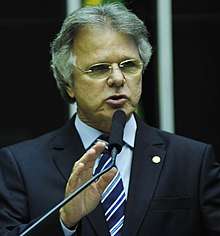Vanderlei Macris
Vanderlei Macris (born 20 May 1950) is a Brazilian politician and lawyer. Having been involved in politics since 1972, Macrus has spent his political career representing São Paulo, having served as state representative in the lower house of the national legislature from 1975 to 2007 and the state legislature from 2007 to 2011 and since 2012.[1]
Vanderlei Macris | |
|---|---|
 Macris in February 2015 | |
| Federal Deputy for São Paulo | |
| Assumed office 12 August 2012 | |
| In office 1 February 2007 – 31 January 2011 | |
| State Deputy for São Paulo | |
| In office 1 January 1975 – 31 January 2007 | |
| Vereador for Americana | |
| In office 1972–1974 | |
| Personal details | |
| Born | 20 May 1950 Americana, São Paulo, Brazil |
| Political party | PSDB (1988–) PMDB (1970–1988) |
Personal life
Macris was born to Ivo Macris and Laura Macris (née Tuckmantel) in the city of Americana.[1] His son, Cauê Macris, is also a politician.[2] Before entering politics Macris worked as a lawyer.[1]
Political career
From 1972 to 1974 Macris served in the city council of his home town of Americana. In 1975 he was elected to the São Paulo Legislative Assembly where he served as president from 1999 to 2001.[1] In 2017 his son Cauê was elected president of the São Paulo Legislative Assembly, becoming the first father-son duo to have served as presidents.[3]
In the 2006 Brazilian general election Macris was elected to the Federal Chamber of Deputies.[4]
In May 2010 Macris voted in favour of the Ficha Limpa or "Clean Record Act" which barred politicians who had been impeached from holding office.[5]
Macris voted in favor of the impeachment motion of then-president Dilma Rousseff.[6] He voted in favor raising the spending ceiling of Brazil's government and the 2017 Brazilian labor reforms[7] Macris voted in favor of a similar corruption investigation into Rousseff's successor Michel Temer.[8]
In November 2016, Macris opposed "caixa 2" amnesty bill,[9] along with fellow federal deputies Onyx Lorenzoni,[9] Alessandro Molon,[10] Fernando Francischini,[11] Carlos Sampaio,[11] Joaquim Passarinho,[11] and Senators Alvaro Dias[12] and Ana Amélia Lemos,[13] listening to the claims of the civil society that signed for the approval of the 10 Anti-corruption Measures, and of the Public Prosecutor's Office, author of the bill.[9]
References
- "VANDERLEI MACRIS – Biografia". Câmara dos Deputados do Brasil (in Portuguese). Retrieved 20 December 2019.
- "Cauê Macris" (in Portuguese). Assembleia Legislativa do Estado de São Paulo. Retrieved 7 October 2019.
- Hupsel Filho, Valmar; Zucchi, Gustavo (15 March 2017). "Cauê Macris é eleito para a presidência da Alesp" (in Portuguese). Estadão. Retrieved 7 October 2019.
- "Apuração - São Paulo - Deputado Federal" (in Portuguese). Folha Online. Retrieved 12 December 2019.
- "Quem aprovou o ficha limpa: veja como os deputados votaram". Congresso em Foco (in Portuguese). 5 May 2010. Retrieved 20 December 2019.
- "Reforma trabalhista: como votaram os deputados" (in Portuguese). Carta Capital. 27 April 2017. Archived from the original on 21 February 2019. Retrieved 18 September 2017.
- "Veja como deputados votaram no impeachment de Dilma, na PEC 241, na reforma trabalhista e na denúncia contra Temer" [See how deputies voted in the impeachment of Dilma, in PEC 241, in the labor reform and in the denunciation against Temer] (in Portuguese). G1 Globo. 2 August 2017. Retrieved 20 September 2019.
- "Como votou cada deputado sobre a denúncia contra Temer" (in Portuguese). Carta Capital. 4 August 2017. Archived from the original on 21 February 2019. Retrieved 18 September 2017.
- Nascimento, Luciano (23 November 2016). "Presidente e relator de comissão anticorrupção repudiam anistia a caixa dois" (in Portuguese). Agência Brasil. Retrieved 3 November 2018.
- ""No Congresso parece existir fantasma", diz Molon sobre anistia ao caixa dois" (in Portuguese). Jovem Pan. 25 November 2016. Retrieved 3 November 2018.
- "Tentativa de votar proposta sobre caixa dois é alvo de críticas em comissão especial" (in Portuguese). Câmara dos Deputados. 20 September 2016. Retrieved 3 November 2018.
- "Alvaro Dias critica tentativa de anistia a quem fez "caixa dois"" (in Portuguese). Senado Notícias. 20 September 2016. Retrieved 3 November 2018.
- "Senadora é contra tentativa de anistiar Caixa 2" (in Portuguese). Senadora Ana Amélia. 14 November 2016. Retrieved 3 November 2018.